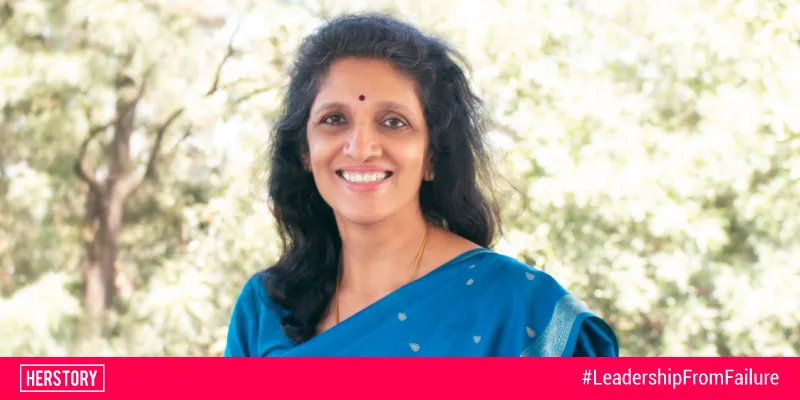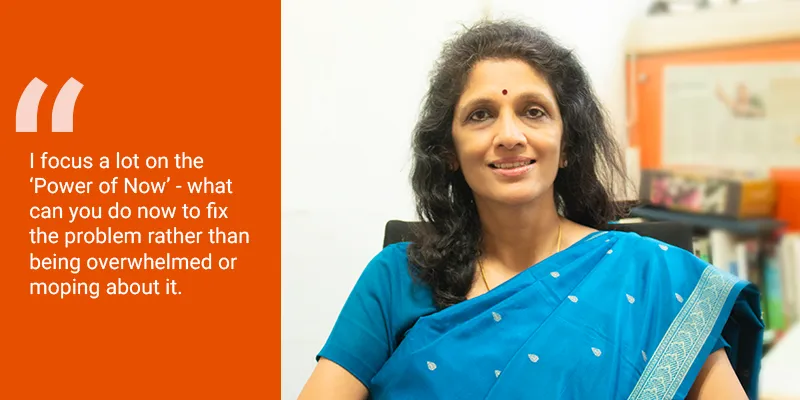[LeadershipFromFailure] Meena Ganesh on why 'it’s important to fix a problem when it occurs'
In our new series Leadership From Failure, starting today, we highlight what entrepreneurs and leaders have learned from their mistakes and how they have used failure as a stepping stone to become leaders and role models. Today, we hear from Portea MD and CEO Meena Ganesh.
Meena Ganesh is Managing Director and CEO, Portea Medical and Partner, GrowthStory. Founded in 2013, Portea is India’s largest home healthcare company, headquartered in Bengaluru. Founded in 2011, GrowthStory is an entrepreneurship platform that promotes greenfield ventures.

Making an early mark
Meena graduated from IIM Calcutta in 1985 and started working soon after. She spent seven years with NIIT, followed by stints at PricewaterhouseCoopers and Microsoft. In 2000, she co-founded a BPO company, CustomerAsset, and then went on to become the CEO of Tesco’s offshore shared service centre. At Tesco, she was part of a global leadership team of 40, one of the four women and the only Indian in the group.
In 2008, she co-founded Tutorvista, which provided digital education solutions for schools, and post tutorial centres. It was later acquired by Pearson, an education company.
Taking it as it comes
When it comes to challenges and failures, Meena reiterates that entrepreneurship is a bumpy road. There is a thin line between breakthrough success and a non-working model. An entrepreneur goes through many emotions ranging from exhilaration to despondency many times in a month. There have been several moments in the past that I would say were not ideal: running out of ideas, running out of cash, workable models etc, during the journey. But this is what makes entrepreneurship both exciting and fulfilling.
She recalls the period as a first-time entrepreneur when CustomerAsset focused on online businesses but “the bottom fell out of that market very quickly during the "dotcom bust” and the company had to quickly pivot and go after brick-and-mortar players.
The tide turned when the first few pilots were executed for Providian in the US, Admiral Insurance, Prudential, BT and BSkyB in the UK. “We proved that offshoring could be done successfully out of India. What started as a trickle of business coming in soon turned into a surge,” she recalls.
She shares another anecdote as part of her association with Portea. When she started Portea, she reveals, hospitals weren’t keen to tie up as it was fairly new in the healthcare space.
“The concept of established, professionally-run home healthcare services was unheard of. But we stayed the course and focused on execution and brand-building and, today, we have 75 hospitals across categories as our partners including Jaslok Hospital, Narayana Hrudayalaya, Medanta, Manipal Hospitals’, Columbia Asia, Max Healthcare, Fortis, Cumbala Hill Heart Institute, etc. Among the hospitals, a vast majority of partnerships have been the result of incoming requests. In fact, the CEO of a top hospital insisted they wanted to partner with us as they didn’t want their perception of their home healthcare services to be adversely impacted by not having Portea as their partner,” Meena says.

Nothing is permanent
Meena believes that when it comes to reviving failed startups, it is important to take an objective and impartial view so as to “drill down and understand the reasons why the business is struggling. Reevaluating your business model (or ‘pivoting’) is often the most fruitful approach if you are getting insufficient traction,” she says.
She is optimistic in her belief that failure is never permanent. “You need to keep plugging away with tenacity and passion. I focus a lot on the ‘Power of Now’ - what can you do now to fix the problem rather than being overwhelmed or moping about it,” she asks.
“Having said that, it is important to have a support system that will help you cope. In my case, it is my family,” she says, as she signs off.
Tell us how you deal with failure? Do you struggle to surmount the challenges and feel overwhelmed or strive to find ways to fix the problem?






![[LeadershipFromFailure] Meena Ganesh on why 'it’s important to fix a problem when it occurs'](https://images.yourstory.com/cs/wordpress/2018/07/LeadershipFromFailure-Meena-Ganesh.png?mode=crop&crop=faces&ar=16%3A9&format=auto&w=3840&q=75)




